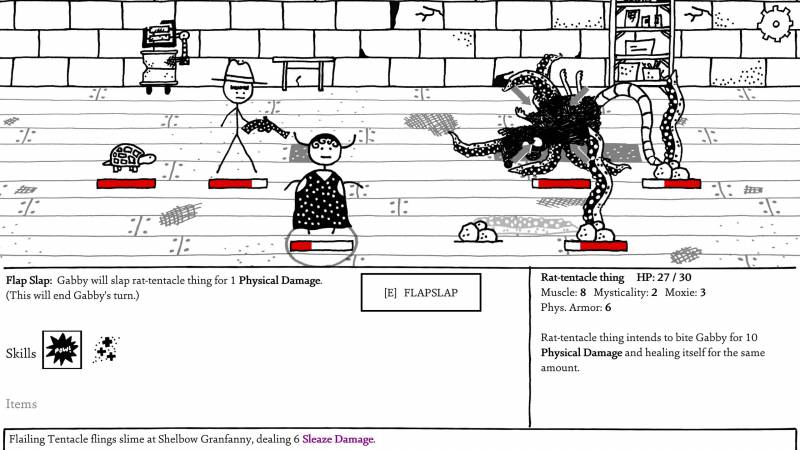The Lowdown
You should absolutely give Shadows Over Loathing a buy if you like witty dialogue, enjoy a simpler RPG that doesn’t require too much consideration into the overarching mechanics and background statistics and want to have a chuckle while playing.
Overall
Pros
- Witty dialogue and atmosphere
- Simple and accessible combat system with ample amounts of XP
- Some genius quest design, especially the ones involving time travel
Cons
- Excessive amounts of items that you can’t really get rid of because you may need them
- Generalized character progression so that your character choices don’t seem to matter
Upon looking at this article, your first instinct might be, “why on earth is Flint playing a children’s game?” I’d then ask you to stop drooling on the floor and open your mind a bit because, while the art is simplistic and this game requires a fair amount of reading, those who like witty banter and silly humor are in for a real treat. Shadows Over Loathing is an excellent and specific type of game whose intricacies cannot be seen by simply looking at screenshots.
I played the game for about 10 to 11 hours, and here are my thoughts.
Shadows Over Loathing is a game from Asymmetric, and while you may not be familiar with them right off the bat, they have, in fact, been around for a while.
During young Flint’s secondary school days, he used to sneak off when the teacher wasn’t looking and play Asymmetric’s online browser-based game, The Kingdom of Loathing. I’m sorry that fractions weren’t that exciting, but to be honest, if you think fractions are exciting, that’s a you problem.
Shadows Over Loathing obviously doesn’t have a lot going for it from a graphics standpoint, but whatever investment sacrificed on that score was rerouted into the storytelling and little tidbits of humor scattered around the world.
If you are at all familiar with this studio’s style of work, this is more of the same. The pictures in this article may require some zooming in as there are exclusively text-based interactions. If you’re not interested in doing copious amounts of reading, you’re best off doing something more to your interest, like tic tac toe or eating crayons.
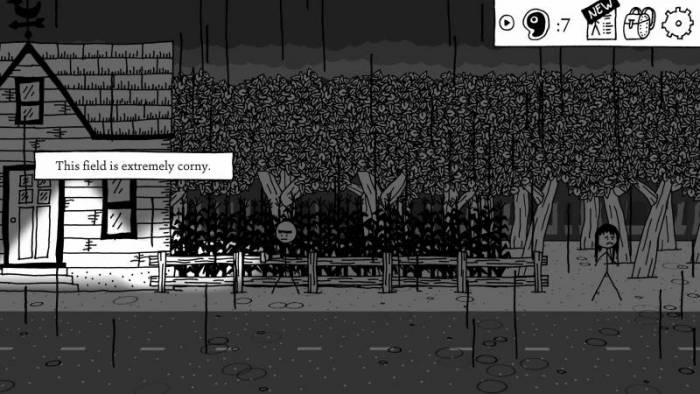
Make sure you aren’t like this field, dear reader. Be a-MAIZE-ing instead.
Ok, Then, What Exactly Is Shadows Over Loathing All About?
Shadows Over Loathing is a Role Playing Game where your character explores a two-dimensional world, meets new NPCs, develops skills to overcome challenges, and completely ignores the main quest until all side objectives are complete.
Instead of the standard Strength, Dexterity, and Constitution arrangement of stats, you have “Muscle,” “Mysticality,” and “Moxie.” Have a guess which is my favorite.
I won’t leave you in suspense; I picked Moxie because I’m just that type of guy. Why beat the shit out of your enemies when you can be a smooth operator with the sweet sound of jazz?
It’s very hard to describe this game with words, as this is truly one of those titles that must be experienced firsthand to truly appreciate it, but I will do my best.
You are a random person whose Uncle Murray has sent them a cryptic message to join him at his Antique Shop in Ocean City. Upon arriving, the player quickly realizes that what perhaps was a simple bonding experience is more than it seems.
Not only has Uncle Murray vanished, but the antique shop he operates specializes in magical objects…of the CURSED variety — the LOVECRAFTIAN cursed variety.
For the uneducated, that means more tentacles than your cousin’s browsing history and more dimensional antics than a Marvel movie.
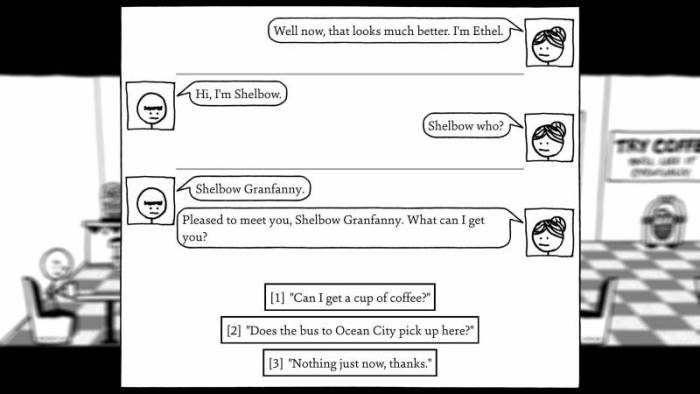
A legend is born.
All you can really do is continue to find these artifacts in the hope that they will eventually lead you to Uncle Murray.
As you progress through the story, you will be sent to new regions surrounding Ocean City, such as the local university (S.I.T.) or the nearby Crystal Lake.
Shadows Over Loathing is a game that rewards the inquisitive, as you should leave no stone unturned in your adventures. Even the most mundane of interactions with an object, NPC, or piece of scenery may yield a clue, experience, or even an item/skill for you to use.
The best way that I can describe this game through metaphor is of a very convoluted spider web. Something inconsequential that you have found or something seemingly meaningless that you’ve discussed with an NPC can serve as an “Aha!” moment sooner rather than later.
A clear example is by helping out the various Hobos you meet around town. They’re scattered all over the map doing various activities like taking an abandoned stove for cooking or selling pencils to college students.
But getting in their good graces unlocks the ability to understand scribblings around the maps called “Hobo Code” (if you’re familiar with Dungeons and Dragons, think “Thieves Cant”).
This gives you hints to solve mysteries or gives you loot that you can use to use for quests or combat. Helping more hobos gives you access to more pieces of the code, and you will soon be reading the glyphs like a master.

Another example is making sure to locate and flush every toilet you find because these give you a large boost in experience points for conducting an activity you’re probably doing right now as you read this article.
No, I’m not spying on you; I just know the average person’s diet is high-octane, and proximity to a porcelain throne is a benefit most will understand.
That being said, I do not recall ever in my life being as excited to see a toilet as I have in this game, and I’ve eaten some suspect street food multiple times.
Outside of the main quest, you can engage in side jobs for various people you meet on your adventures or get thrown into random encounters as you meander around the maps. This is actively encouraged, not only so that you can see the sheer breadth of content available but also because doing so will net you experience and gear you may need.
These can be as mundane as grabbing a frat boy’s jacket from a frat house to as elaborate as engaging in a logic puzzle to determine who may have committed a murder in a boarding house dedicated to traveling salesmen. You never know what will show up in Shadows Over Loathing.
Combat takes place on a turn-by-turn basis, where you and your party face off against often multiple comical enemies that all intend to do you harm. Mousing over each individual enemy will indicate what they plan to do to you or your companions. Hence, there is a strategic element when it comes to taking out high-priority targets.
Shadows Over Loathing is a game of skill checks where your value in your various stats dictates what you are able to do and interact with. Need to pick up a hat that is curiously made out of stone? You better have 6 in your muscle stat.
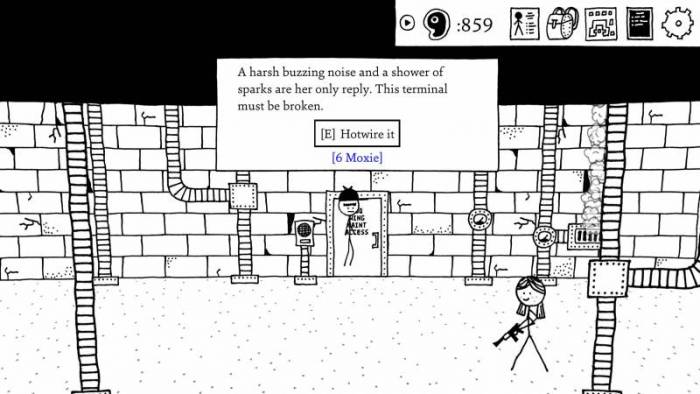
Want to open a door that reeks of piss? You better have 5 Stench Armor. So on and so forth.
After a certain point, additional utility is granted by finding books or touching weird shit in the world, so exploration becomes even more important as you move onward into the story when you select all your additional skill upgrade options.
As I write this, I took a “free” recliner from a frat house on the S.I.T. campus after passing the necessary skill check to do so.
Back in the back room of the antique shop that I lovingly call my Home Base, the recliner sits there, and every day it will provide me with a perk called “Inherent Stink” for +3 stench armor just by sitting in it!
Shadows Over Loathing Delightful Moments and How The Devil Is in The Details
In what may be an absolute head-scratcher of a statement, Shadows Over Loathing may be one of the most immersive games I have ever played.
It is relentlessly married to the specific art and comedic style of the world you find yourself in, with almost nothing being tacked on for no reason. The level of intent immediately propels this game to another level.
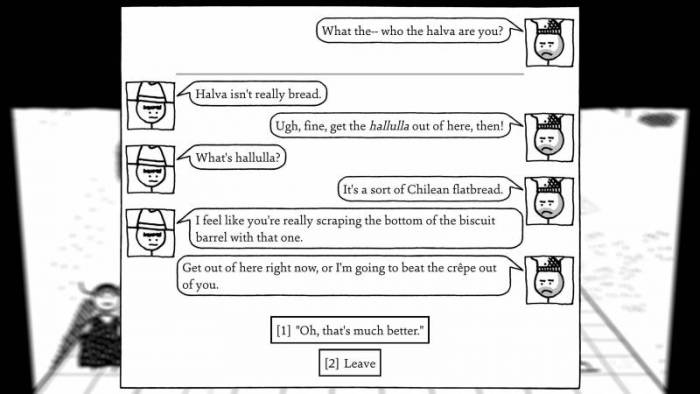
Floury pun work.
There are quite a few characters in Shadows Over Loathing, and you’ll be happy to know that while each of them has an eccentric charm about them, they all still seem fundamentally different.
From a college student whose entire identity revolves around the acquisition and consumption of barbecue sauce (honestly, I can relate), to a bus driver who encourages you to fill up his gas tank because he doesn’t like getting wet in the rain, to a goblin boss who has developed a cult revolving around the playing of the glockenspiel, it’s a treasure trove of goofiness through and through.
This extends to locations as well.
In the S.I.T. institute, for instance, where you take classes to graduate and locate a cursed book hidden somewhere on the campus, you have to head to different wings and classrooms that focus on various subjects.
There is one such location called the “Infinite Hallway.” The game asks you if you are sure you would like to explore it, and if you’re a skeptic, you may be inclined to mosey down the hall to see exactly how far it goes. I only made it to room 28, but if Reddit is to be believed, this hallway will ACTUALLY go on forever.
While that is a more literal sense of the game zagging around my expectations, there were more convoluted moments in the narrative that likewise had an exquisite level of detail.
These normally were side-quests that involved dimension hopping and time travel to solve. Most of the time, these required a little bit of thinking but weren’t over the top complicated, and it makes you feel like a time detective with a big brain when you complete them.
Here are two examples varying in complexity:
1. A lighthouse keeper asks you to replace a component in a pump because, somehow, the inside of a lighthouse has become flooded. No, this doesn’t make sense.
Upon investigating the pump, you identify the required component and set off to find it.
In your meandering, you stumble across a general store, only to find that the part required is no longer in production. Going into the store’s back room reveals a portal that transports you to the past.
Upon convincing the very same store owner that you are not a thief but merely an inspector and that it’s totally normal for you to emerge from within his store, you buy the part you need and bring it back to the present for the installation.Quest completed.
2. You go to this little town preserved as a historical site for apparent “witch burnings” in the past.
In this town, your character finds a portal that transports them to (you guessed it) the past, where you find that a lot of the leftover “pagan,” “demonic,” and “witchy” shit left about are actually just children’s stuff that has degraded through time.
In fact, a little girl named Patricia has been accused by the local rich kid (Peter Proctor) of a bunch of small misdeeds and has been put in a kangaroo court trial as punishment.
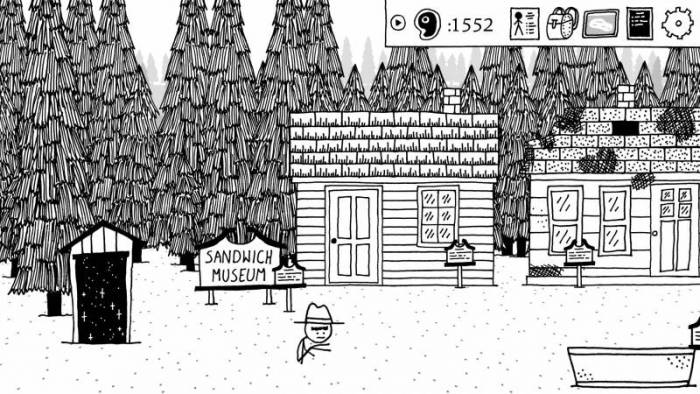
Side note, your shoes change your walk, so right now, I’m dragging my ass on the ground like a dog with worms, as any good lawyer would.
You sign up as her defense attorney to investigate the accuracy of these charges, which are: stealing a pocket watch, making a dumb-looking doll, and calling the rich kid a stinky head in graffiti. Horrendous stuff, to be sure.
Anyway, in the past, you can enter Peter’s familial home and eavesdrop on his parents talking about a secret compartment in their son’s bedside table. Returning to the present, you can enter his room and find a severed doll arm within this compartment. One charge down.
Then you have to go buy some tracing paper, go to the past, and find the outhouse that has the incriminating writing. After imprinting the writing with charcoal, in the present, you see one of the children’s diaries with the exact same style of writing!
Distracting the security guard (because they think it’s a pagan artifact), you then take a page to prove that Patricia did not write that shit. Charge two down.
Then you find a shovel somehow, and after talking to his mum in the past, she reveals that Peter (the little bastard) never leaves his pocket watch behind. In the present, you use said shovel to dig the f*cker’s grave up and find the pocket watch there.
This doesn’t necessarily prove Patricia innocent, but the kids accept it.
Patricia is innocent! YAYYY!
It’s convoluted but ingenious all at the same.
Side quests involving time travel aside, other quests involve logic puzzles.
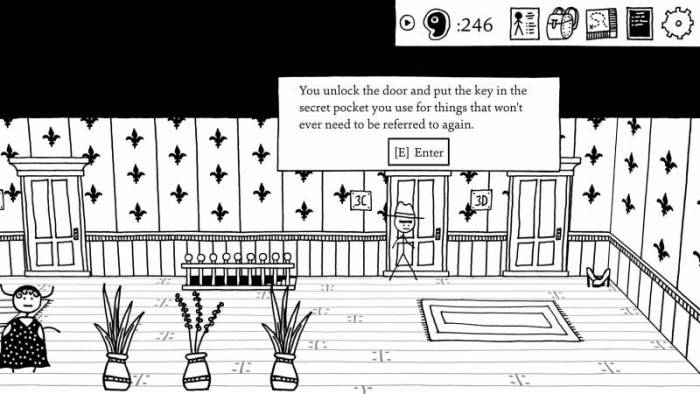
Soooooo trueeeee!
You are tasked with finding who committed a murder at a hostel full of traveling salespeople. Putting the age-old adage that the only good salesman is a dead salesman aside, your character decides they’re up for an adventure and takes the case.
The way to solve this is by asking each of the salespeople lodging at the hostel, and they each give you some ho-hum answer that provides a different piece of information.
For example, one salesman may say that they know for a fact that the guy who sells occult artifacts (suspect numero uno) isn’t located above the guy who sells jokes. Another will say that the pants and the trinket salesmen are rooming next to each other. So on and so forth.
I love puzzles like this and really enjoyed mapping them out on a piece of paper — A+ design.
Also, if you’re in sales, I was making a joke. Have a sense of humor! You must realize half your colleagues think you suck, and the others barely tolerate you, so it helps to laugh about it.
To be clear, that was another joke.
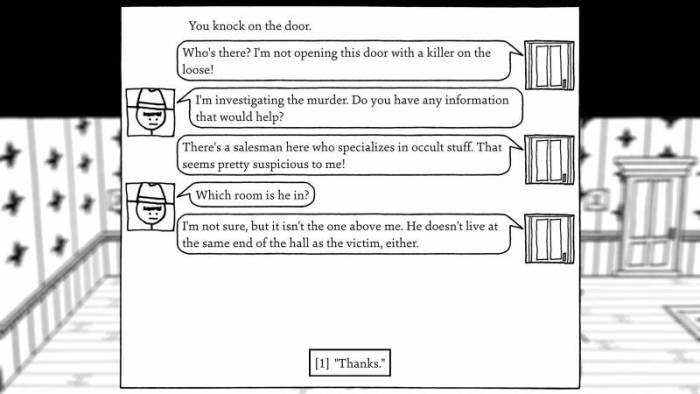
These aren’t every single task you are given in Shadows Over Loathing, as there is obviously a fair amount of “go here and fetch that and bring it back to me” quests, but I felt the mix was pretty great.
And then there are the little additions that are just crazy cute.
As mentioned, I picked the character who specializes in Moxie, known as the Jazz Agent. This character is at their best when using musical instruments to wreak havoc against enemies, so right now, my character is throwing a literal cymbal that zooms back to me like a boomerang after bashing someone.
I was having fun, don’t get me wrong, but it really cranked up when I discovered a book on my travels poetically called “History’s Worst Honking.” Reading it granted me a skill very near and dear to my heart: “The Sax of Violence.”
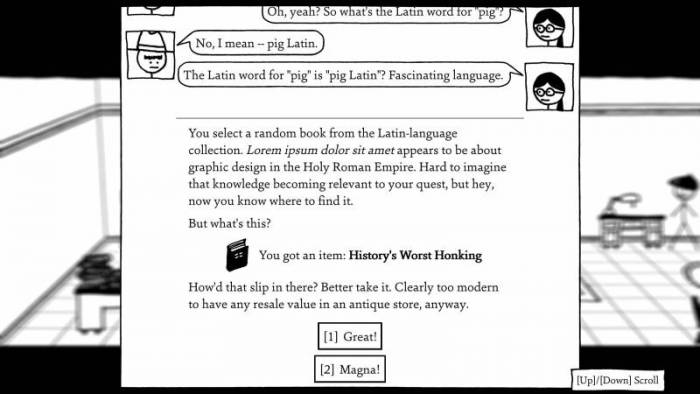
It’s not even that good; at the start of every turn my character has, it’ll automatically deal a small amount of damage to all enemies in the encounter.
What sold me on it and the reason I will (perhaps sub-optimally) use it every single time, even if it’s not going to help me much, is because it will interlace saxophone riffs into the background music.
I’m not even joking that this ability increased my enjoyment of the combat 100 times.
Likewise, in Ocean City (the starting map), there is a gang of goblins whose schtick is that they play the glockenspiel.
Upon finding their hideout, you are greeted by an audible chorus of ting bing ting sounds as four goblins furiously play their instruments to obstruct you from the boss battle.
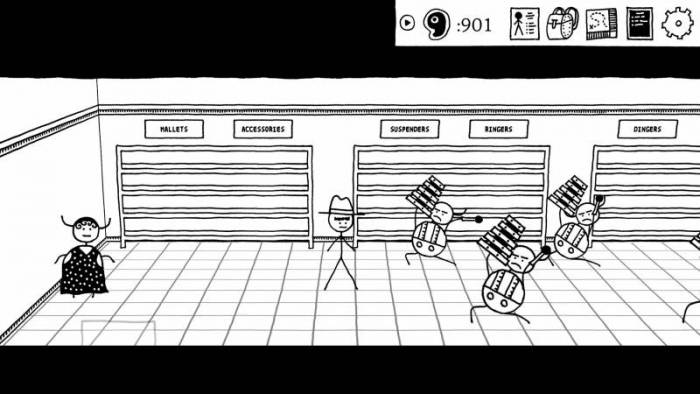
12/10 intimidation.
Convincing each of them to stop their hammering through various means (more skill checks) causes the background music to slowly grow softer until, finally, there is only silence.
Shit, even in the pub you take over in the main town, there’s the click-clack of some drunk vigorously playing the spoons as he saunters around the bar. You can actually watch the guy on his mini odyssey traversing the premises, nary a care in the world.
It’s not all sound immersion, however.
In the S.I.T. University, you can chat with a janitor who says he graduated from the very institution he works for. Apparently, they had a liberal arts wing right there at the school, and it’s responsible for making him what he is.
Upon finding this department, it’s literally a janitor’s closet, mops, buckets, and all. This made me audibly guffaw as an alumnus of a liberal arts college, and it’s somehow quite poignant.
These are just a few examples of the level of detail that was put into this stick figurine world, and it is really where the charm of this game resides.
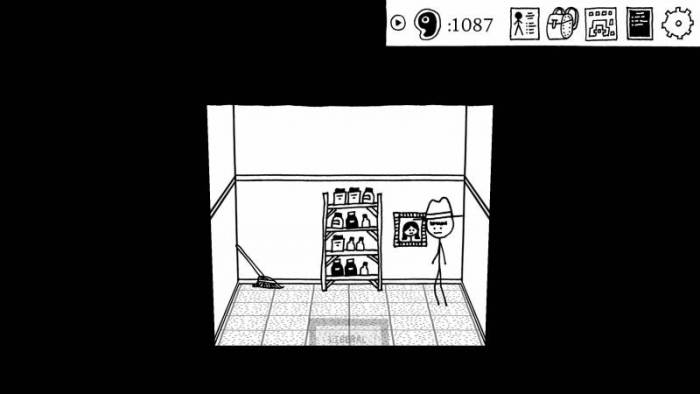
Behold, my alma matter.
What is Progression in Shadows Over Loathing Like?
As everything is ruled by your core stats, it is important you get as much experience as possible. You see, I promise that’s why I’m fiddling with toilets, not because of some subversive GI tract issue.
Thankfully, there are plenty of opportunities to grab experience points outside of main/side quests, the most common of which is combat.
I didn’t find Shadows Over Loathing‘s combat super interesting, to be honest, but it’s likely that’s because it was extremely forgiving. At the base level, you’re allowed to use one attack, one skill, and one item per turn at maximum. That’s three opportunities to do some sort of damage every round.
You will also have a companion that gets one action by default and a pet that automatically does their special ability on their respective turns.
Companions and pets level up as well, but you are 110% the decider on whether a fight is successful or not, so don’t think you can crouch behind your Snake’s skirt. Figgis (my mosquito) is handy, but I don’t see him Mike Tyson-ing anyone on his own.
You always start off with a full allotment of health, so in that sense, you don’t have to worry too much about Hit Point management. This is nice because, in some games like Divinity: Original Sin II, it felt more like a status management simulator for your status effects.
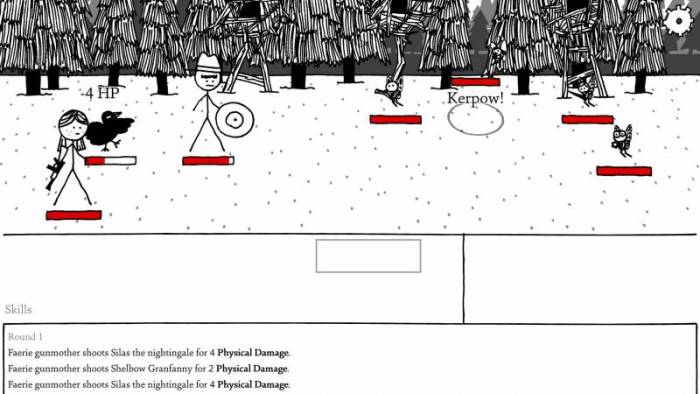
Enemies are pretty diverse, but the damage they deal is simply grouped into physical damage vs. elemental/effect damage. Examples of this are bleeding, fire, sleaze, and stink.
Your equipment and natural perks can provide you resistance against specific types of damage.
If your skill points are high enough, you can often outright avoid encounters to still receive the experience anyway. In my opinion, the only reason you would jump into a fight you can avoid is an opportunity to farm up additional items and meat, which is the currency of this world you’ve found yourself in.
In addition to constantly starting you off with a full health pool, there is no penalty that I’ve noticed for a party wipe.
Shadows Over Loathing just throws you back out into the last place you were. So let’s say that you were wiped out by a particularly tough battle where a spider stacked up poison damage on you to an insurmountable level, and you got your shit pushed in.
If it was a miniboss, they’ll spawn you back outside the encounter so you can quickly equip any poison resistance gear you have in your inventory before you try again. If it was a standard enemy, you fail it and carry on your journey with perhaps a small debuff status effect that doesn’t really impact much.
This is part of the reason it’s probably better never to throw away or sell a piece of gear that gives you a specific statistical or resistance benefit. More on that later.
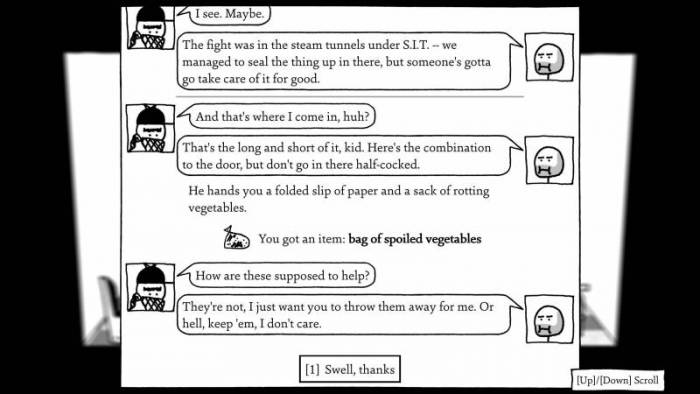
Dirtbag move.
Shadows Over Loathing isn’t a game where there are a set amount of encounters, either. Very much like strolling down memory lane, there are no shortages of opportunities for your character to get traumatized.
Meandering from place to place on the maps will often allow you to stumble upon a small fight or dialogue encounter so you can actually farm up what you need with impunity.
Your experience points can be spent on standard skills or on specific abilities gained through the reading of books. These books will have a stat requirement to understand and get the benefit from, but you tend to make clumps of progress at once as your stats increase, so this never felt like an inhibitor for me.
Shadows Over Loathing is not an especially complicated experience and is immediately accessible to new gamers.
It’s clear the main focus in development was the story/world-building, and they wanted you to pay more attention to that than worry about if you had enough health potions or if you can output enough damage. This leads me to …
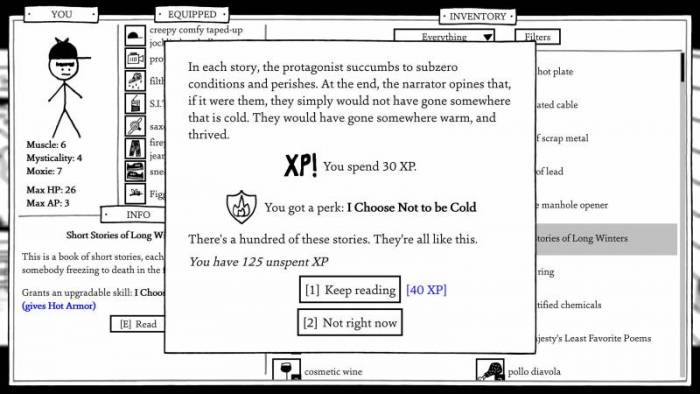
Shadows Over Loathing Criticisms
While this section may be longer than expected, I will stress that for this specific niche and style; Shadows Over Loathing is excellent. It’s witty, it’s charming, and taking the time to engage with it can be very rewarding.
My first issue is that, in general, the game was perhaps too forgiving and, because of this, diminished player agency.
In most RPGs, you pick a specific character class, and your role/actions will typically stay in line with your choice. For example, you wouldn’t expect a barbarian with the strength of an ox and the table manners of a donkey to be the party member you’d choose to schmooze for information at a fancy gala.
In Shadows Over Loathing, they’ve seemed to take on a Jack-of-all-trades approach so that your core stats were never too far away from each other numerically. This, coupled with an infinite pool of experience points to be acquired, made me feel like, ultimately, my choices didn’t matter that much. Even if I wasn’t able to handle a strength-based challenge, after a few minutes, I probably would be as opposed to having to find another way to solve a problem.
I suppose it helped keep things accessible, but this sort of defeated the purpose of it all for me.
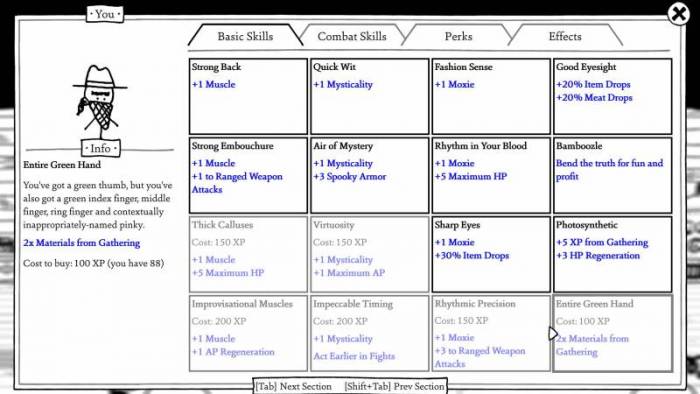
Zero specialization in the skill tree; it’s a wide, wide spread across your core stat values.
Second, while the vast majority of Shadows Over Loathing‘s puzzles were pretty amusing and balanced, a few stuck out that served as an actual wall in my gameplay progression/enjoyment.
The most notable one that comes to mind is the Chemistry Puzzle at S.I.T. You must pass three courses at the university to graduate; through misfortune, I selected “Chemistry” as an elective.
Evidently, I had learned nothing from my high school days, where Chemistry was my single least favorite subject. I thought this would be a moment of growth for me, but my optimism was sorely misplaced.
Oh, sorry, we’re writing a review, not dealing with latent trauma.
This puzzle involves mixing together ingredients seemingly at random to make something you can use to progress. It’s a multiple-step affair of trial and error, and while there may be some clue hidden amongst the lines, I failed to notice it in my fumbling attempt to solve the problem.
I’ll say this again, to solve the Chemistry puzzle, you seem to literally have to try combinations of chemicals in different order until you get the one you want…
The goal of mixing these ingredients is to, by luck, create various mixtures that will interact with objects around the Chemistry Lab to move the story along.
For example, Velum softener to read an old textbook that reveals a third ingredient (which you must obviously find). After doing this two times more times and finally getting the concoction that your professor asked you to make, you’re done with a completely asinine quest line.
While there aren’t QUITE as many possible combinations as you would think due to the fact that the first two digits and the last two digits correspond to specific product names (i.e., 12XX produces Umbraline______, and XX11 produces _______ Bleach) but it’s still more than I’d have liked to do.
The fact that the game describes the action as an “archaically experiment” means that they know they’re wasting your time — such cheek.
When compared to the logic puzzle at the aforementioned hostel, it’s very much night and day because the logic puzzle had a clear mechanism for solving it by eliminating possibilities based on clues.
Do yourself a favor and don’t pick Chemistry as a major in this game, or look up an online guide.
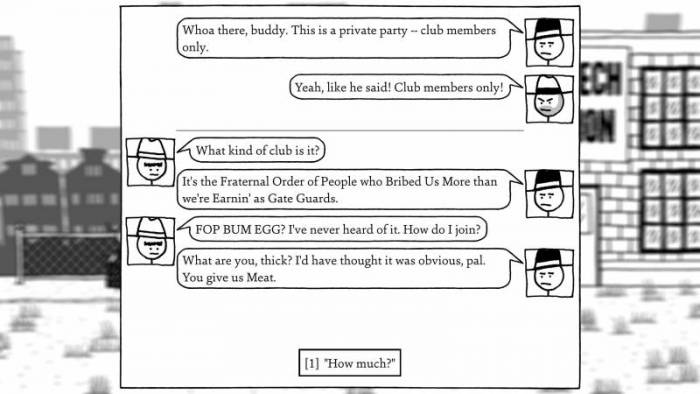
The next nitpick I had is the overabundance of items that get thrown at you.
In almost every combat encounter and interaction, you will get some sort of consumable that will aid you or debuff an enemy, but there were simply too many for my liking.
Now, I can hear you screaming, “but Flint, you can just sell this stuff you idiot. Why are you bitching?”
Well, fetus, that’s because considering the sheer amount of skill checks you must pass to progress and not knowing what’s going to come up, it is in your best interest to keep these items on hand so you can, I don’t know, lockpick that door you don’t have enough Moxie for or apply a bandage that stops bleeding when a vampire sucks you off.
Due to the randomness of challenges, you never really know what you will need, so I keep almost everything I have collected just in case. That extra boost of Mysticality given by a necklace may help to defuse a reactor, or your Hot Armor pants may help you remain conscious because you’ve stumbled into a fishperson sauna.
As your gear will also provide various ability modifiers, such as increased stats or more ranged damage so it’s important to keep at least one of each item that buffs a specific aspect handy at all times.
This, combined with Shadows Over Loathing‘s black and white art style, means that it’s remarkably lackluster to look at all these items. The simplicity of the Shadows Over Loathing UI can be a virtue, but not when you’re sifting through 100s of items at a time when the monochromatic nature blurs everything into one.
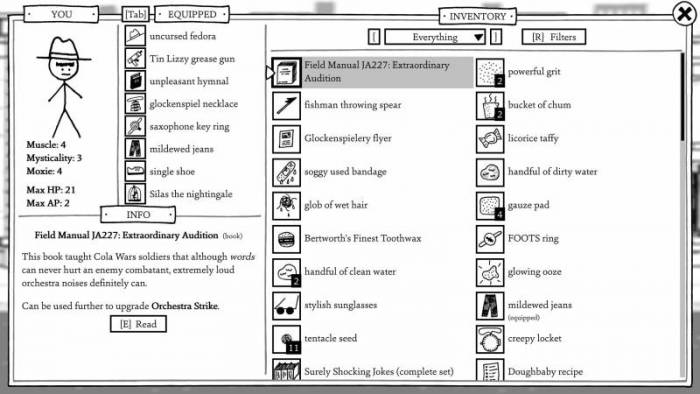
My final small thing is that the tone can be draining in prolonged doses. It is undoubtedly this franchise’s greatest strength, but simultaneously, it can be something holding back the overall experience when every last portion of dialogue has some clever jape or twist to it.
I find myself wishing every once in a while that a character would just get to the point.
Even in the most mundane of quests/tasks, like finding fishperson roe for a guy named Rufus, he will monologue a little longer than needed while your character plays the “straight man” in a 2D Laurel and Hardy routine.
I think this really worked in their online browser game because you were given a certain amount of “energy” to complete tasks and adventure in a given day, so you were forced to take a break while your character’s energy refreshed.
In Shadows Over Loathing, there is no such barrier, and you are just adrift in a tide of never-ending caveats and witticisms that honestly gave me a little bit of a headache at times.
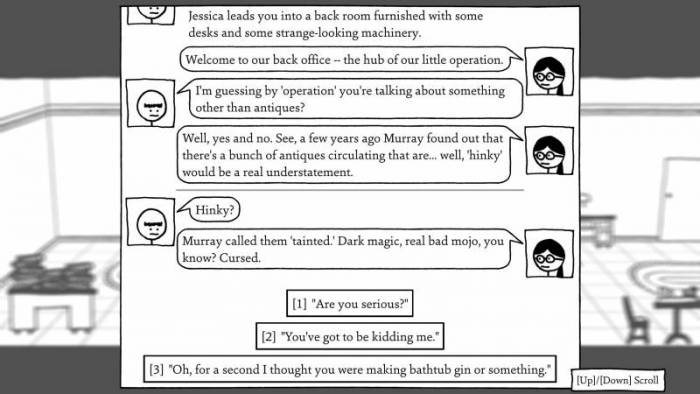
Still, I very much liked the overall experience, so this leads us to the following:
Should You Buy Shadows Over Loathing?
Despite a little bit of a lengthy critique section, this game is excellent, provided you are interested in this genre (and if you can read).
There is 1000% a market for games like Shadows Over Loathing, and I’m glad that Asymmetric has decided to continue expanding its quirky storylines onto other platforms. In a game ecosystem of big-budget studios putting out the same exact shit with a slightly different coat of paint, I have to applaud a studio doing something different and doing it so well.
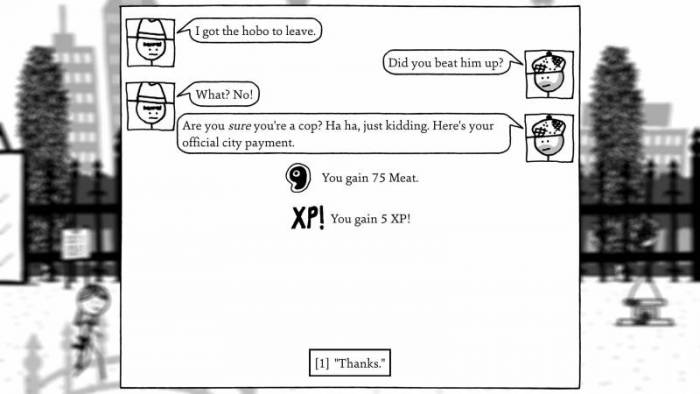
LOL, no comment.
Just recently, at Nintendo’s Indie World Summit, it was announced that Shadows Over Loathing is now available on the Switch in addition to already being out on PC.
Shadows Over Loathing may be the perfect game for the Switch, as the device’s portable nature means you’ll be in situations where engrossing yourself in a kooky world with lots of reading would be beneficial. I, for one, would love to try to play this game on an airplane to forget how cramped my knees are.
In fact, I’ll probably purchase it for my Switch the next time I have a long-haul flight.
To be honest, even if it wasn’t particularly my cup of tea all the time, this game is a 4/5, provided you like its style. I’ve been told I can be quite sardonic in nature, so the humor did resonate with me, but perhaps it’s a lesson of “everything in moderation” in my own life as well to taper my relentless sarcasm every once in a while.
You should absolutely give Shadows Over Loathing a buy if you like witty dialogue, enjoy a simpler RPG that doesn’t require too much consideration into the overarching mechanics and background statistics and want to have a chuckle while playing.
Shadows Over Loathing sells for $22.99 and up, depending on the platform; it is available from GameStop, Steam, Nintendo, Amazon, Serenity Forge, Best Buy, and other retailers.
Developer: Asymmetric
Publisher: Asymmetric
Source: Manufacturer supplied review sample
What I Like: Witty dialogue and atmosphere; Simple and accessible combat system with ample amounts of XP; Some genius quest design, especially the ones involving time travel
What Needs Improvement: Excessive amounts of items that you can’t really get rid of because you may need them; Generalized character progression so that your character choices don’t seem to matter
